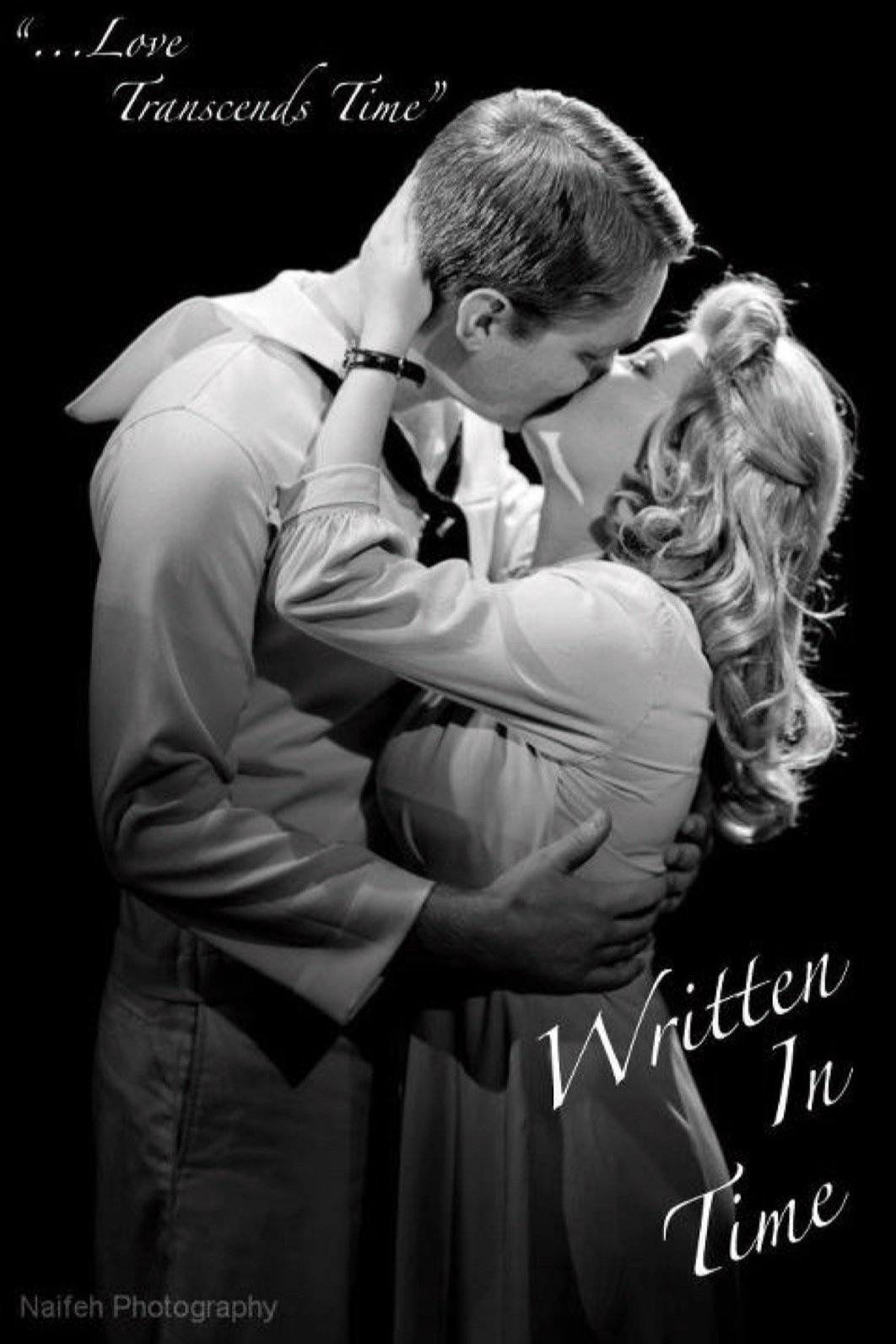WRITTEN IN TIME
"There is a tangible sense of yearning that envelopes 'Written In Time,' an exquisitely sad little memory play... artfully crafted by Matthew J. Edwards
and currently treated to a classy premier staging by Rover Dramawerks."
--Theatre Jones
REVIEWS
By Christopher Soden
The Examiner
Matthew J. Edwards' Written in Time is a charming, engaging, wistful play, that explores the connection between fate (or divine intervention?) and romance. It also considers the distinction between the search for a genuine soul mate and recreational sex. And then, there's the concept of time, though Written's ideas about the function of time and our cosmic destinies might be a tad confusing. The way that Edwards uses time, as a component in our lives that can be random, fatal or even illusory is intriguing, if not necessarily compelling. The story of Angelica Sullivan (and Richard "Stretch" Smith) a young woman who falls in love with a sailor, just before the bombing of Pearl Harbor, is at times quite moving and fresh enough to keep us involved. Sometimes I wasn't quite sure how Written was addressing the deeper, more introspective issues, though this feels essentially less urgent.
Written begins with a parallel structure. Angie, unlucky in love, discovers a box of old letters and a journal, stowed away in the attic of the home she's occupied for many years. The diary and correspondence belonged to her grandmother, Angelica, and as she reads them, she (and girl friend Deb) vicariously start to participate in the exquisite relationship between Angelica and Stretch. Then we are introduced to Rick, who likes to chill with best buddy Brad, despite the fact he's a real troglodyte with the ladies. Brad is all too willing to fix Rick up with an easy lay, but Rick is looking for a woman he can love forever. These two stories cut to and fro with the radiant, evolved, intelligent courtship that develops between Stretch and Angelica. Ironically, Written suggests that Rick and Angie's less impetuous, altruistic values are antiquated, while also explaining promiscuity was not uncommon more than seventy years ago. They just talked about it differently.
Written is composed in a pattern of pairing, recapitulation and echoes. Angelica and Veronica share the same connection as Angie and Deb. Stretch and Doc the same as Rick and Brad. They're not identical, but at the core, quite similar. Edwards also repeats scenes and exchanges. A particular dialogue between three sailors in 1945, might find itself reincarnated in present day. (Ah, the more things change, the more they remain the same.) Matthew Edwards has an impressive skill for depicting an authentic, spiritually motivated, yet heated romance without ever coming off as corny, quaint, or didactic. When Brad asks Rick if he's gay, simply because he's not a rampant horndog, it has a very contemporary feel to it. But we roll our eyes, because Edwards makes an excellent point. Surely (though it may have less to do with orientation than gender) men have been chiding each other this way for centuries.
I suppose we can always make a case for scripts that achieve salient clarity if not lyricism. And when I say "lyricism" I don't necessarily mean like Shakespeare or Chekhov. Mamet and Rabe, for all their dogged grit and volatility, attain a musicality and verve. There were times I wished Written had perhaps reached a little higher to match the intense spark, delight and ecstasy that Angelica and Stretch were feeling.
Written in Time turns on the idea that we pathetic, ridiculous, swoony mortals are at the mercy of some higher power. And there may be something to that. It's human nature, I think, to cut our losses when a relationship seems to plummet. It's a way of protecting ourselves. But, then, it also makes us wonder when it's appropriate to defy our stars, and make our own luck. I can't tell if Written is mapping territory between celestial interference and the need to participate in our own lives, or suggesting that resistance is futile. When we see a thwarted romance consummated by Stretch and Angelica's grandchildren, I'm just not sure what to make of that. Understand please, Written in Time is pleasurable, absorbing and poignant, and these seeming inconsistencies are relatively trivial. It's a grand evening of theatre and a show you shouldn't miss.
Rover Dramawerks proudly presents Written in Time, by Matthew J. Edwards, playing from May 17th to June 9th, 2012, at The Cox Building Playhouse. 1509 H Avenue, Plano, Texas 75074.
By Perry Stewart
Theatre Jones
There is a tanigble sense of yearning that envelopes Written in Time, an exquisitely sad little memory play currently treated to a classy premiere staging by Rover Dramawerks.
The action shifts back and forth between World War II and the 21st Century, and this heightens the poignance. The audience knows more than the characters, and we wish we could help the poor fools.Angelica and Richard meet and fall in love in Hawaii in August of 1941. He's in the Navy, assigned to a ship anchored in a place called Pearl Harbor. Romance rules. What could possibly go wrong?
Flash forward six decades. Angelica's granddaughter and namesake, Angie, has discovered a chest full of Richard's and Angelica's love letters. Hurting from a failed marriage, the young woman reads the letters slowly, prolonging the experience of getting to know the writers. But there are two more letters Angie doesn't yet know about. One was never mailed. Another is delivered 60 years late due to a postal service glitch.
That's about all the plot synopsis you need to know. Any more information might defuse the various surprises that playwright Matthew J. Edwards has artfully crafted. Director Carol M. Rice has assembled a first-rate cast and has staged with obvious affinity for the material. Edwards wasn't afraid to put period-correct cornball dialogue in the mouths of his characters. Flirty guys address their quarry as "Doll Face," and a young woman might excuse herself "to go powder my nose."
In an inspired touch, Angie slips into the archaic vernacular of her grandmother's letters. Lizzie Dunnet shines in these and other moments as she does a keenly nuanced job of navigating Angie's moods. Kate Werner has played eccentric teens with notable recent success (in More Fun Than Bowling and Lord of the Flies). Now she sparkles as grown-up (but girlishly romantic) Angelica. Her scenes with Jake Shanahan, as Richard, are appropriately tinged with awkward shyness.
Jarod Warren sketches Doc, Richard's swaggering pal, in bold strokes. And he also excels as two other un-named male characters, each one distinctive. Versatile guy. Jade Reyes, as Doc's vivacious sweetheart, has a difficult challenge as her character evolves, and not in a happy way. Reyes makes you care.
Late arriving Rick seems something of an afterthought. J. Kyle Harris does what he can with the role, while Young C. Lee (as Rick's wild friend, Brad) all but munches the scenery in Plano's Cox Playhouse. Pain-in-the-ass character, dynamite performance. Jessica Blaine Elwell, Blake Owen and J.R. Bradford deliver the perfunctory goods as assorted satellite characters.
Costume designer Suzi Cranford has created some marvelous 1940s outfits for Werner and Reyes, but pays little attention to Dunnet's modern-day Angie. Poor girl. She deserves better.












